Choosing the right sweeteners isn’t just about taste—it’s crucial for your health and overall well-being. Many struggle silently, unsure which options are safe or effective. Understanding sweeteners can empower you to make better choices, improve energy, and avoid hidden risks. Let’s uncover the truth together.

What You'll Learn About Sweeteners
The different types of sweeteners and sugar substitutes
Health impacts of sweeteners, including common misconceptions
How to interpret labels and daily intake guidelines
Expert recommendations for safe use of sweeteners
How to avoid bad sweeteners and unhealthy food additives
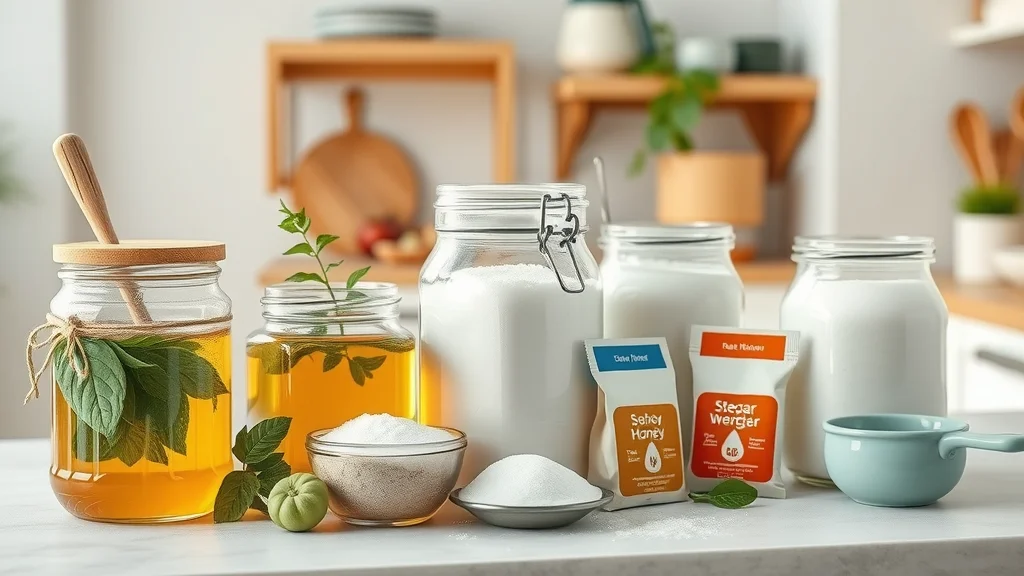
Understanding Sweeteners: A Quick Overview
Making informed choices about sweeteners and sugar substitutes is more important than ever, especially with the wide variety of options and conflicting advice available. These products aren’t just for weight control—they can directly impact your overall health.
Sweeteners, including natural sweeteners, artificial sweeteners, and sugar alcohols, come in many forms, each affecting the body and metabolism differently. Whether you aim to reduce added sugar consumption or want to manage conditions like diabetes, understanding these differences is vital for healthy living. Modern sweeteners range from natural, like honey and stevia, to artificial sweeteners and sugar alcohols including erythritol.
Unlike traditional added sugars that contribute directly to calories, some sugar substitutes provide an intense sweet taste with little or no energy content. This distinction can benefit those concerned about weight gain, tooth decay, or metabolic health. By the end of this article, you’ll be able to identify the healthiest options, avoid misunderstood dangers, and make considered choices when interpreting nutrition labels—all supported by the recommendations of science-based authorities and medical experts.
Comparison Table: Types of Sweeteners vs Added Sugar
Type |
Examples |
Calories |
Sweetness (vs Sugar) |
Food Additive Status |
Key Health Aspects |
|---|---|---|---|---|---|
Natural Sweeteners |
Stevia, Monk Fruit, Honey |
Low to High |
Stevia: 100–300x, |
Varies |
May offer antioxidants, less likely to spike blood sugar |
Artificial Sweeteners |
Aspartame, Sucralose |
Zero |
200–600x |
Approved by FDA |
No calories, controversies over long-term use |
Sugar Alcohols |
Xylitol, Erythritol |
Low |
0.6–1x |
Generally Recognized as Safe (GRAS) |
Low glycemic index, may cause GI discomfort |
Nutritive Sweeteners |
Sucrose, Fructose |
High |
1x |
GRAS |
Energy source, can cause weight gain |
Added Sugar |
Corn Syrup, Cane Sugar |
High |
1x |
GRAS |
Linked to obesity, tooth decay, heart disease |
What Are Sweeteners and Sugar Substitutes?
Sweeteners are food additives added to foods and beverages to provide a sweet taste, replacing or supplementing added sugars. Sugar substitutes include a diverse group of compounds such as artificial sweeteners, sugar alcohols (such as xylitol, sorbitol, erythritol), nutritive sweeteners (agave nectar, honey), and food additives designed to mimic the qualities of sugar without all the calories or effects on glucose.
Each of these has a different metabolic impact and carries individual health considerations. Many are many times sweeter than sugar, so only small amounts are required for sweetness. The acceptable daily intake (ADI) for each food additive sweetener—a safety benchmark maintained by regulatory authorities such as the FDA in the United States and EFSA—ensures these sweeteners are safe when consumed within recommended daily intake limits.
"Many patients don't realize that sweeteners can have very different health effects. It's essential to understand both the benefits and risks." – Dr. Maria Gonzales, Registered Dietitian
The Science Behind Sweeteners: How They Work
Food additives used as sweeteners act differently depending on their chemical nature. For example, artificial sweeteners such as aspartame or sucralose are developed to provide a sweet taste but are not metabolized by the body the same way as sugar, resulting in little to no calorie intake.
On the other hand, sugar alcohols, which are often used in sugar-free gum or “no added sugar” products, provide sweetness and a small number of calories but don’t raise blood sugar levels as much as regular sugar. Because sugar alcohols are only partly digested, they may cause gastrointestinal discomfort in some users if consumed in excess, such as bloating or gas.
Understanding metabolism of these products helps you make informed daily choices. The acceptable daily intake for each sweetener is scientifically established, ensuring even frequent consumption remains within safe limits. While some sweeteners—especially nutritive sweeteners like honey—also bring additional nutrients, others simply provide sweetness without contributing to dietary nutrition. With such variety, evaluating each for your health profile is essential.

Types of Sweeteners: From Natural to Artificial
Natural Sweeteners and Their Health Impacts
Stevia: Extracted from the Stevia rebaudiana plant, it is many times sweeter than sugar but contains no calories. Stevia is popular among individuals who want a plant-based option with a low glycemic index and is considered safe for most people, including those with diabetes.
Monk Fruit: Monk fruit sweetener, derived from the Luo Han Guo plant, contains antioxidant compounds called mogrosides that are responsible for its sweet taste—up to 200 times sweeter than sugar. It has no calories, is well-tolerated, and generally considered safe.
Raw Honey: Though still a sugar, raw honey also contains trace vitamins, minerals, and antioxidants. It offers a complex flavor and may have antimicrobial properties, yet should be used in moderation as it does impact blood sugar and caloric intake. Not recommended for babies under one year of age.
Natural sweeteners often appeal to health-conscious consumers and those seeking "clean label" ingredients in foods and beverages. However, using large amounts—even of these natural options—can result in similar effects as other added sugars, including potential weight gain and dental concerns.
Artificial Sweeteners: Safety and Risks
Aspartame: Used in many diet sodas and sugar-free foods, aspartame is 200 times sweeter than sugar and nearly calorie-free. It is approved by authorities in the United States and globally but should be avoided by individuals with phenylketonuria (PKU).
Sucralose: Common in "splenda" products, sucralose remains stable when heated, making it suitable for baking. It is 600 times sweeter than sugar, contains no calories, and is regarded as safe by the FDA when consumed within recommended limits.
Saccharin: One of the oldest sweeteners, saccharin boasts a sweetness up to 300 times that of sugar. While past concerns over cancer risk have been largely dismissed by newer studies, excessive consumption should be avoided and daily intake monitored.
Artificial sweeteners are strictly regulated as food additives by the FDA and are only approved after comprehensive safety testing. While deemed safe for most people at normal intake levels, studies continue to explore long-term health implications, with some controversies remaining around gut health and appetite regulation.
Sugar Alcohols: Pros and Cons
Xylitol: Found in many chewing gum brands and "sugar-free" candies, xylitol helps reduce risk of tooth decay but can cause digestive upset in large amounts.
Erythritol: With negligible calories and a glycemic index close to zero, erythritol is a common choice for low-carb diets. It is well tolerated but, as with other sugar alcohols, excessive consumption may lead to digestive issues.
Sorbitol: Used in diabetic-friendly foods and oral care products, sorbitol is about 60% as sweet as sugar and has fewer calories. Overconsumption may cause bloating or laxative effects.
Sugar alcohols are useful alternatives to both sugar and artificial sweeteners, providing sweetness with minimal impact on blood glucose. However, children and those with sensitive digestion should exercise caution.
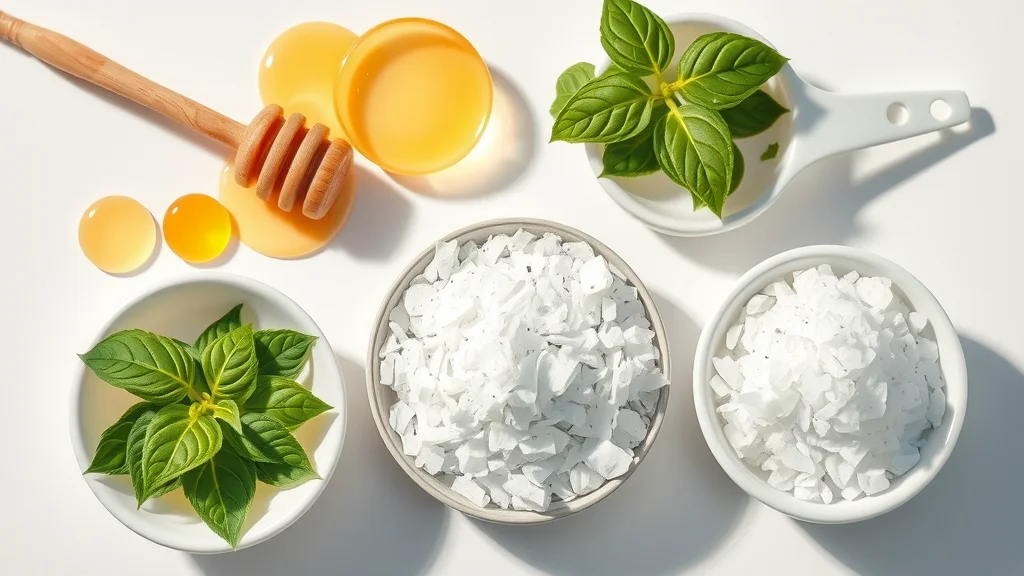
Comparing Sweeteners to Added Sugar: Key Differences
The main difference between sweeteners and added sugar lies in their metabolic and health effects. While added sugars (like cane sugar and high-fructose corn syrup) increase calories and rapidly spike blood sugar, most sugar substitutes are designed to minimize these effects.
Additionally, the United States classifies sweeteners differently as food additives, with strict regulations on their use in foods and beverages. Consumer confusion is common, with many struggling to differentiate between sugar alcohols and artificial sweeteners when reading nutrition labels. Regulatory bodies, like the FDA, continually review scientific data to set acceptable daily intake limits and provide consumer guidance.
"Consuming large amounts of added sugar is linked to obesity and heart disease, while certain approved sweeteners may offer a safer alternative for some individuals." – Dr. Helen Yoon, Endocrinologist
Evaluating Sugar Substitutes: Benefits and Drawbacks
Nutritional Value of Sugar Substitutes
Most artificial sweeteners and sugar alcohols provide little to no calories, making them effective sugar substitutes to help manage weight gain and maintain healthy blood glucose levels. However, nutritive sweeteners like honey or agave syrup do contain calories, sometimes nearly as much as traditional added sugars.
While sugar substitutes may support dental health and lower caloric intake, they don’t replace other essential nutrients in your diet. Some natural sweeteners offer trace vitamins or antioxidants, but these benefits are minor unless consumed in very large amounts—something not recommended due to potential side effects.
For those specifically interested in how sweetener choices can impact weight management, exploring strategies for creating a sustainable calorie deficit can further support your health goals. Learn more about practical approaches in these expert tips for achieving weight loss through gradual calorie deficit.
Potential Health Risks of Artificial Sweeteners and Food Additives
Ongoing research continues to evaluate the safety of artificial sweeteners and food additives. While the FDA and global authorities consider them safe within recommended limits, overconsumption could have negative effects, such as gastrointestinal issues with sugar alcohols or possible changes in gut microbiota with certain artificial sweeteners.
Concerns about cancer risk have largely been debunked, but those with allergies or particular metabolic conditions should consult a physician before regular use. Adhering to established acceptable daily intake is essential to avoid health problems.
Sweeteners Approved in the United States
In the United States, the Food and Drug Administration (FDA) regulates and maintains a list of sweeteners approved as food additives for safe use in foods and beverages. These include aspartame, sucralose, acesulfame potassium, saccharin, stevia extracts, and sugar alcohols like erythritol and xylitol. Only food additives proven safe in extensive testing receive approval, and all products must clearly label each sweetener to help consumers monitor intake.
How Much Is Safe? Understanding Acceptable Daily Intake
The acceptable daily intake (ADI) is the maximum amount of a food additive—such as a sweetener—that can be safely consumed each day over a lifetime without adverse effects. These values, determined by regulatory agencies like the FDA and EFSA, vary for each type of sweetener. For example, sucralose’s ADI is 5 mg per kilogram of body weight, while aspartame’s is 50 mg per kilogram. Exceeding the ADI is unlikely for most people, due to the high sweetness potency requiring only small amounts. Following ADI guidelines is especially important for children, pregnant women, and individuals with special conditions.
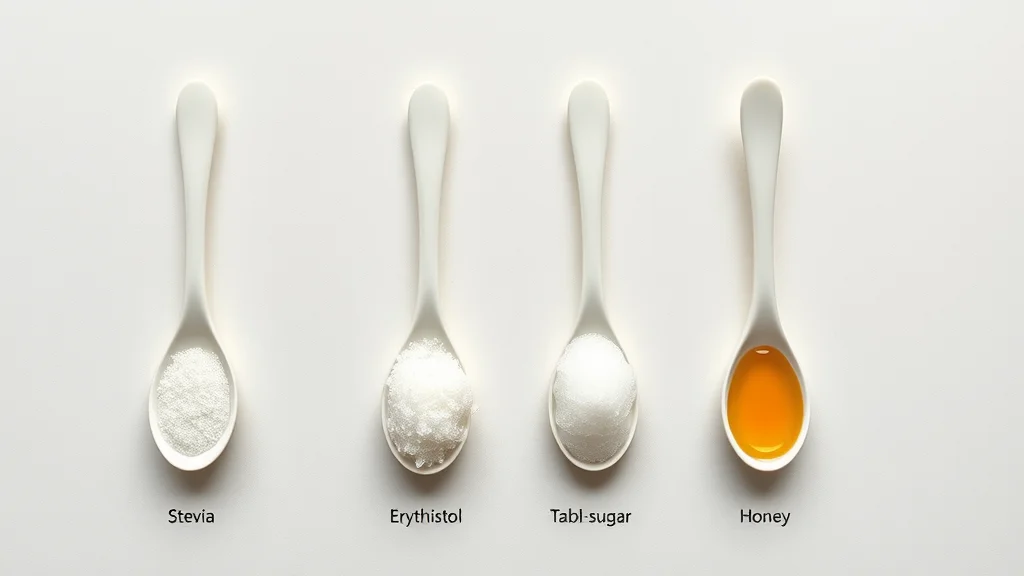
Sweeteners and Specific Diets: What to Consider
Low-carb/keto diets: Sugar alcohols such as erythritol and xylitol are popular for their minimal impact on blood sugar and compatibility with low-carb lifestyles.
Diabetes management: Non-nutritive sweeteners, including stevia and monk fruit, help maintain a sweet taste without increasing blood glucose, making them suitable for diabetic diets.
Children and adolescent consumption: While some sweeteners are approved for use in foods aimed at children, it’s essential to adhere to ADI values and consult health professionals to avoid overuse and potential digestive disturbances.
"For clients managing diabetes, selecting the right sweetener can help stabilize blood glucose without sacrificing taste." – Dr. James Patel, Certified Diabetes Educator
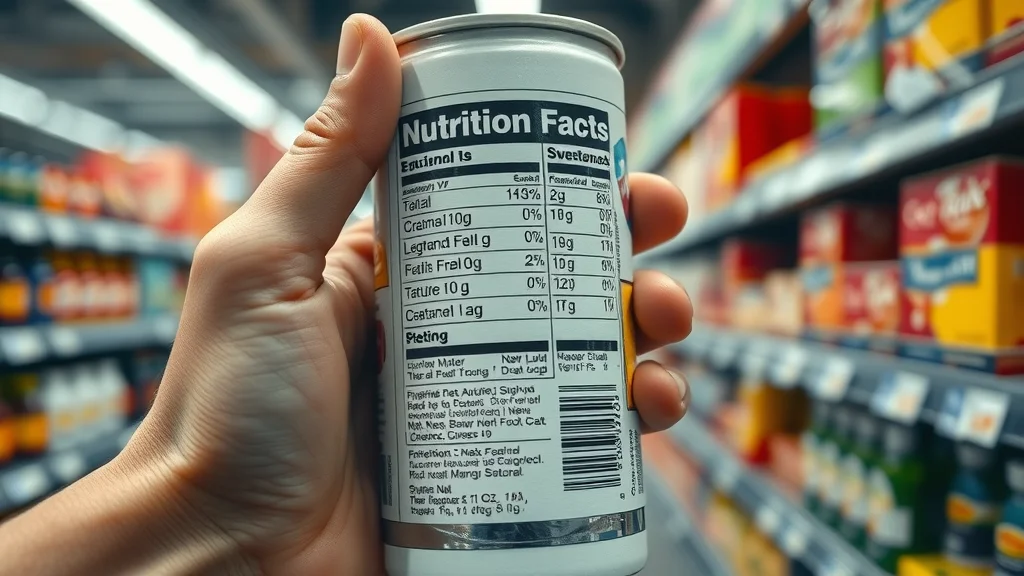
Interpreting Food Labels: Spotting Hidden Added Sugars and Food Additives
Reading ingredient lists: Look for names such as sucralose, aspartame, stevia, or sugar alcohols. These indicate the type of sweetener used in the product.
Identifying added sugars: Syrups, cane crystals, corn sweetener, or words ending in “-ose” typically signal hidden added sugars that can increase calorie intake.
Recognizing sugar alcohols: Ingredients like xylitol, erythritol, maltitol, and sorbitol can be spotted in many “sugar-free” products. Sensitive people should check for potential digestive side effects.
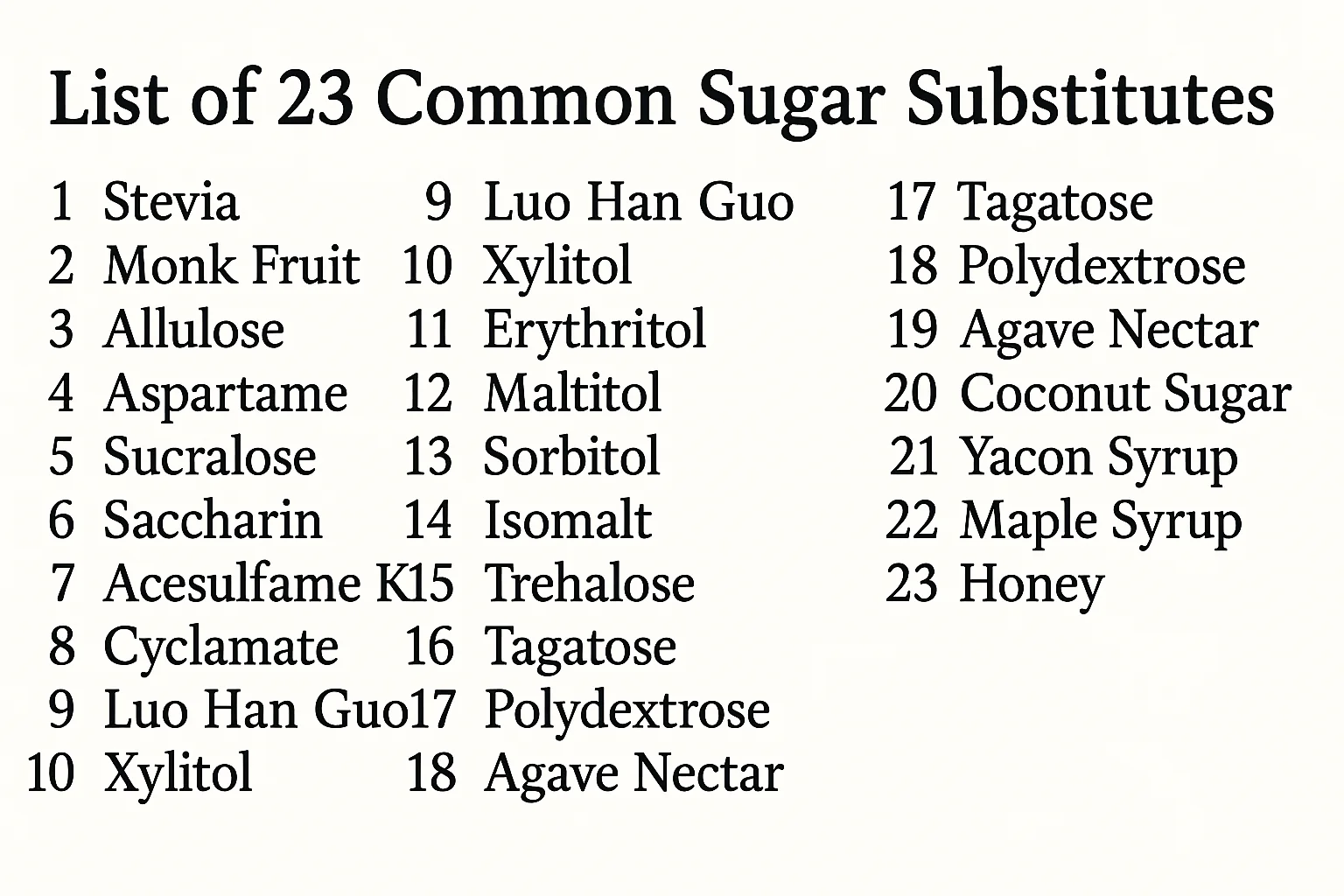

People Also Ask About Sweeteners
What is the healthiest sweetener?
The healthiest sweetener can depend on personal health needs, but options like stevia and monk fruit are frequently recommended by health professionals for their low calorie counts and natural origin.
What are 5 commonly used sweeteners?
Five commonly used sweeteners are stevia, aspartame, sucralose, erythritol, and monk fruit.
What are 23 sugar substitutes?
As listed above, 23 sugar substitutes include natural sweeteners, artificial sweeteners, and sugar alcohols—each offering unique attributes for taste and safety.
What are the bad sweeteners to avoid?
Some sweeteners, like high-fructose corn syrup and certain artificial additives, are best avoided due to potential health risks. It's advisable to consult with healthcare professionals regarding acceptable daily intake and long-term effects.
Expert Tips: Choosing Sweeteners Wisely
Always check for added sugars and food additives in products
Limit daily intake per health authority guidelines
Be cautious with new or lesser-known sweeteners
Key Takeaways on Sweeteners and Sugar Substitutes
Not all sweeteners are created equal; choose wisely according to your health needs
Understand the difference between natural, artificial, and sugar alcohol sweeteners
-
Consult credible sources and expert opinions for the latest recommendations
-

FAQs About Sweeteners
Are sweeteners safe for daily consumption?
Most sweeteners approved by regulatory agencies are safe for daily consumption within the recommended ADI limits, though individual tolerance and health conditions vary.How do sweeteners affect blood sugar?
Non-nutritive sweeteners and some sugar alcohols have minimal impact on blood sugar, making them a better choice for people concerned with blood glucose levels.Can children safely use sugar substitutes?
Some sugar substitutes are permitted in foods marketed to children, but intake should be closely monitored by parents and pediatricians to avoid excessive consumption and potential side effects.What is considered an acceptable daily intake for popular sweeteners?
ADI values depend on body weight and the specific sweetener. The FDA provides published limits for each; consult these or discuss with a healthcare professional to understand what you can safely consume each day.
Further Resources and Cited Studies
Watch: Low-Calorie Sweeteners
.
Explore More Sweetener Options and Expert Reviews Today
Ready to make informed choices? Discover and compare trusted sweeteners recommended by experts to support your health goals.
Conclusion
Smart sweetener choices begin with knowledge—read labels, respect safe intake guidelines, and consult experts to promote better health for you and your family.
If you’re interested in taking a broader look at how food components can influence your health, it’s worth exploring the role of other dietary factors—like oxalates found in vegetables—and how they interact with your overall wellness strategy.
Expanding your understanding of nutrition beyond sweeteners can help you make more holistic, confident choices for your diet. For a deeper dive into the science and myths surrounding plant-based foods, check out this comprehensive guide to oxalates and their impact on health.
Understanding the various types of sweeteners and their health implications is crucial for making informed dietary choices. The U.S. Food and Drug Administration (FDA) provides a comprehensive overview in their article, “How Sweet It Is: All About Sweeteners,” detailing the different categories of sweeteners, their safety evaluations, and regulatory statuses.
In addition, the American Heart Association offers insights into the use of low-calorie sweeteners in their piece, “Non-Nutritive Sweeteners (Artificial Sweeteners),” discussing their role in diet and potential health effects.
For a deeper understanding of sugar substitutes and their impact on health, Johns Hopkins Medicine’s article, “Facts About Sugar and Sugar Substitutes,” provides valuable information on different types of sweeteners and their uses.
If you’re serious about making healthier sweetener choices, these resources will equip you with the necessary knowledge to navigate your options effectively. NCWellnessHub.com
 Add Row
Add Row  Add
Add 




Write A Comment